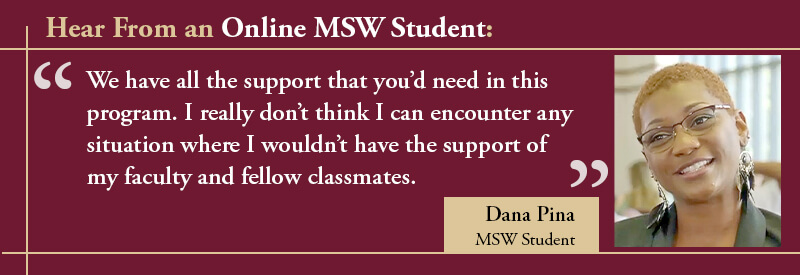How to Write a Great Social Work Resume

Originally published July 17, 2018 and updated April 10, 2023
There are many factors to consider when putting together application materials for a graduate program. From transcripts to test scores, it can be a monumental task to ensure that you have all of the materials you need to best present yourself to an application review committee. Amid all these materials, the resume can sometimes be overlooked or receive less scrutiny.
For Florida State University College of Social Work’s online Master of Social Work (MSW) program, the resume component of the application bears substantial importance, as the review committee considers this document to be a good indicator of whether applicants will thrive in the program. For example, while describing your social work or volunteer experience is essential, experience beyond the field of social work is just as important to include. A great social work resume can highlight your background and stress your preparation for a graduate degree in social work.
Three Tips for Writing a Social Work Resume
It’s easy to get overwhelmed with the hundreds of thousands of templates out there, contradictory LinkedIn posts, and all the other noise you come across in your day-to-day life. The good news is that we have been receiving social work resumes for years now and we can tell you exactly what makes a candidate stand out.
Boiling down your skills and experience to a sheet of paper requires organization, personalization, diligent editing, and thoughtful audience consideration. Seeking work and seeking admission into a graduate program will require different social work resume objectives, but the ultimate goal is the same: to show the reader who you are and why you deserve a seat at the table.
Be Organized
The best rule of thumb for any resume is to ensure that the information you include is well organized in a logical format. Most resumes lead off with a professional objective and a list of educational credentials. The most common structures for the resume are chronological, which highlights your accomplishments in the order you achieved them, or functional, which stresses your abilities in different professional aspects and how you acquired them. Either format — and even a blend of the two — can work well, but it is best to keep the various elements clearly delineated.
You can separate elements with bold headers, for instance, or use bullet points to help visually categorize your achievements to keep your document both organized and visually appealing. Regardless of format choice, be sure to consistently include dates of all experiences included.
Be You
Perhaps most importantly, you should ensure your resume tells your story. You can, for example, use an objective statement at the opening of your resume to include a brief sentence or two on what you personally hope to achieve in Florida State University’s online MSW degree program. You should also consider including experiences beyond the field of social work that highlight your unique abilities. The application review committee hopes that each incoming class includes a dynamic student body coming from multiple backgrounds, so any relevant skills you can showcase — even if they were acquired in divergent fields — can be beneficial to include.
Edit Well and Check for Accuracy
Once you have composed these elements in a well-designed and -organized reflection of who you are personally and professionally, the final step is to edit. You should make sure to double-check for spelling, grammar, and tense errors throughout your resume. The review committee will look for accuracy in content and form, as accuracy is an important quality in social work. In other words, you should edit your resume as if it is a writing sample you are adding to your application and be vigilant for even the smallest of mistakes.
Having a mentor or friend review your social work resume is highly recommended. Over time, you will also want to update your resume to ensure that it offers a current and accurate survey of your social work experience. It is wise to review your past listings for any inconsistencies with date or location so that the application review committee has the most up-to-date information on your academic and professional history. If you choose to include references in your resume, make sure to keep their contact information current as well.
How to Write Social Work Resume Objectives
In considering your path to social work, staying grounded in your personal goals is important. Social work is a vast field, and there are many social worker careers you can explore after earning a master’s degree. You want to tailor your resume to the program, but ultimately, you should be seeking a program that is truly suited to you. The objectives you choose to present allow you to articulate your priorities for this next step in your education — while also making it more likely that any program you are accepted to is a genuine match. Great social work resume objectives will likely revolve around these three action verbs: “contribute,” “provide,” and “support.”
Contribute
Outlining how you will contribute to the social work field is always a good start. The career objectives at the top of your resume are the opportunity to outline where exactly you want to contribute followed by how you will do it. You should also consider the purpose of your resume objectives. Hint: This is when you share more about yourself, your passions, and your specific skills. Maybe you are a psychology major and you are planning to contribute by utilizing insights from the research you conducted as an undergrad.
Each objective should outline what you want to do and how you will do it. Universities want to bring in students who plan to make a genuine impact, and this is your opportunity to outline what impact you hope to make in the field.
Provide
As mentioned, this is your opportunity to share what you can bring to the table. Even if you do not have wholly sharpened expertise, the purpose of this program is to properly prepare you to acquire a specific skill set. You can consider what the program teaches and how that will set you up to provide specific services, knowledge, and skills in your work as a licensed social worker. Some examples are counseling, guidance, or strategy. Again, consider who you are, the program’s offerings, and your previous experience, and with all of this in mind, craft what you, specifically, want to provide.
Support
In zooming out and defining social work in the broadest sense, it is a career that aims to help people. Social workers can support specific groups as a whole by working for policy changes, or on an individual level, such as in family settings.
Do you want to learn skills and strategies that will set you up for success in influencing an audience of lawmakers? Are you more interested in speaking for a child’s interests in court? Maybe both? Either way, an objective that emphasizes support will help you clarify both your interests and the way you plan to make an impact.
Build Your Credentials and Connections
Though developing your social work resume can take some hard work, you can craft an expert resume for the field of social work by incorporating these suggestions and by distilling what is most important in your background that showcases your abilities and your potential into one compelling document. Florida State University’s online MSW program aims to cultivate leaders who are prepared for a variety of social worker careers but getting to know each student is valuable as well.
The resume can be a crucial tool for the admissions committee to get to know you and envision how you might benefit from and contribute to the next incoming class. Explore how you can make a good impression with your resume and advance your social work career with FSU.
Complete The Form to Access Your MSW Program Guide
Recommended Readings
